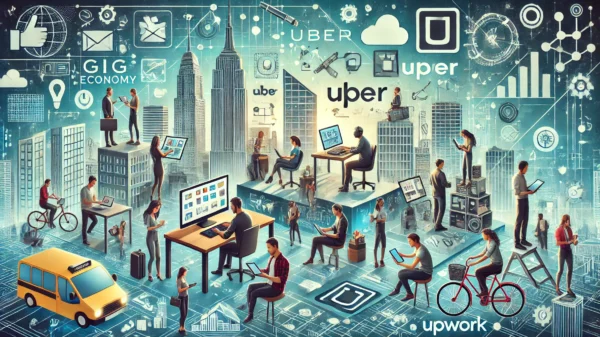The Gig Economy: A New Way of Working
The gig economy refers to a labor market characterized by the prevalence of short-term contracts or freelance work as opposed to permanent employment. This new way of working has gained significant traction in recent years, driven by technological advancements and changing attitudes towards work-life balance.
In the gig economy, workers are often referred to as “gig workers” or “independent contractors.” They have the flexibility to choose when, where, and how much they work, allowing them to pursue multiple gigs simultaneously or focus on other personal commitments. On the other hand, businesses benefit from the ability to tap into a diverse pool of talent on an as-needed basis, reducing overhead costs and increasing operational efficiency.
Opportunities for Workers in the Gig Economy
The gig economy presents various opportunities for workers seeking flexibility and autonomy in their careers. Here are some key advantages:
- Flexibility: Gig workers have the freedom to set their own schedules and work on projects that align with their skills and interests. This flexibility allows them to maintain a better work-life balance and pursue other personal or professional endeavors.
- Income Potential: Depending on their skills and the demand for their services, gig workers can potentially earn more than their traditionally employed counterparts. By taking on multiple gigs or high-paying projects, they have the opportunity to increase their income significantly.
- Skill Development: Engaging in a variety of gigs allows workers to develop a diverse set of skills. They can explore different industries, gain experience in various roles, and continuously learn and adapt to new challenges. This versatility can enhance their employability in the long run.
Furthermore, the gig economy has opened up opportunities for individuals who may have faced barriers to traditional employment, such as those with disabilities or caregiving responsibilities. It provides them with a platform to showcase their skills and contribute to the workforce on their own terms.
Challenges for Workers in the Gig Economy
While the gig economy offers numerous benefits, it is not without its challenges. Here are some key concerns for gig workers:
- Income Instability: Gig workers often face irregular income streams due to the nature of their work. They may experience periods of high demand followed by lulls in projects, which can make it challenging to manage finances and plan for the future.
- Lack of Benefits: Unlike traditional employees, gig workers are typically not entitled to benefits such as health insurance, retirement plans, or paid leave. This lack of security can create financial and emotional stress, especially during unforeseen circumstances or emergencies.
- Unclear Employment Status: The classification of gig workers as independent contractors rather than employees can lead to ambiguity regarding their rights and protections. It can result in issues related to worker classification, minimum wage, and access to social security benefits.
These challenges highlight the need for policymakers and businesses to address the gaps in the gig economy and ensure fair and equitable treatment of gig workers.
Conclusion
The rise of the gig economy has revolutionized the way people work and businesses operate. It offers workers the flexibility and autonomy they desire while providing businesses with access to a diverse talent pool. However, challenges such as income instability and lack of benefits need to be addressed to ensure the well-being and fair treatment of gig workers. By understanding the opportunities and challenges associated with the gig economy, policymakers and businesses can work towards creating a more inclusive and sustainable future of work.


































